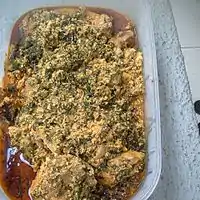Egusi
Egusi (also known by variations including agusi, agushi) is the name for the protein-rich seeds of certain cucurbitaceous plants (squash, melon, gourd), which after being dried and ground are used as a major ingredient in West African cuisine.[1]


Authorities disagree whether the word is used more properly for the seeds of the colocynth, those of a particular large-seeded variety of the watermelon, or generically for those of any cucurbitaceous plant.[2] The characteristics and uses of all these seeds are broadly similar. Major egusi-growing nations include Mali, Burkina Faso, Togo, Ghana, Côte d'Ivoire, Benin, Nigeria, and Cameroon.[2]
Species from which egusi is derived include Cucumeropsis mannii and Citrullus lanatus.[3]
Usage
Egusi soup is a kind of soup thickened with the ground seeds and popular in West Africa, with considerable local variation.[4] Besides the seeds, water, and oil, egusi soup typically contains leaf vegetables, Palm oil, other vegetables, seasonings, and meat. Leaf vegetables typically used for egusi soup include bitterleaf, pumpkin leaf, celosia and spinach. Typical other vegetables include tomatoes and okra. Typical seasonings include chili peppers, onions, and locust beans. Also commonly used are beef, goat, fish, shrimps, or crayfish.
In Nigeria, egusi is common among the people of the southern part of Nigeria,[5] the Yoruba people, Igbo people, Ibibio people and the Efik people and Bahumono of southern Nigeria, the Hausa of northern Nigeria and the Edo people, Esan people, Etsakọ people, Urhobo people and the Itsekiri people of the south-west of Nigeria. Yoruba people in general and quite notably the people of Ọṣun State – especially the Ijesha people – eat "iyan and egusi", a pounded yam and egusi soup.[6] the Ibibio people and the Efik people (Calabar people) of southern Nigeria call it Afere Ikong in their dialect.
In Ghana, egusi is also called akatoa or agushi, and as in Nigeria is used for soup and stew,[7] and most popularly in palaver sauce.[8]
In the late 1980s, the Canadian government funded a project intended to develop a machine to help Cameroonians shell egusi seeds.[9] A machine has been developed in Nigeria to shell egusi.[10]
Gallery
_served_in_Birmingham_UK.JPG.webp) A plate of pounded yam, and egusi soup
A plate of pounded yam, and egusi soup Pounded yam, and egusi soup served with fish
Pounded yam, and egusi soup served with fish Egusi and bitter leaf soup
Egusi and bitter leaf soup
See also
References
- Rachel C. J. Massaquoi, "Groundnut, Egusi, Palm Oil, and Other Soups", in Foods of Sierra Leone and Other West African Countries: A Cookbook, AuthorHouse, 2011, p. 36.
- National Research Council (2006). "Egusi". Lost Crops of Africa: Volume II: Vegetables. National Academies Press (155–171). p. 158.
- Blench, Roger (2006). Archaeology, language, and the African past. Altamira Press. ISBN 9780759104655.
- Badiru, I. & Badiru, D. (2013). Isi Cookbook: Collection of Easy Nigerian Recipes. Bloomington: iUniverse. p. 36. ISBN 9781475976717.
- "The Hirshon Nigerian Egusi 'Soup'". ✮ The Food Dictator ✮. 2016-01-03. Retrieved 2020-05-15.
- "Iyan and egusi Soup", The Vegan Nigerian, 19 May 2013.
- "13 Nigerian Foods That Are Eaten By Ghanaians But Have Different Names" Archived 2016-11-27 at the Wayback Machine, OMGVoice.
- Freda Muyambo, "Palaver Sauce Recipe", About food.
- "Projects in Cameroon". Archived from the original on 2014-11-27.
- Shittu, S. K. & Ndrika, V. I. O. (2012). "Development and performance tests of a melon (egusi) seed shelling machine". Agricultural Engineering International: CIGR Journal.
